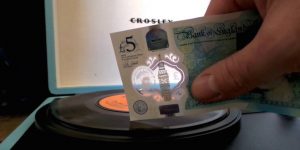 Music
Music
Novelty coloured vinyl is harming the record industry
by Mark Teo
December 17, 2014
Photo by Jan T. Sott
If you haven’t already heard, the resurgence of vinyl is in full swing: LP sales have increased 12 times in the last 20 years, and with it, an unlikely class of stars has emerged—Jack White’s Lazaretto, for example, led all vinyl sales in 2014, and Mac DeMarco’s Salad Days placed in the top 10. Plenty of analogue enthusiasts point to many factors behind the vinyl boom—some cite the “warmth” of vinyl; others cite its connection to musical history; others, like Record Store Day, cite the LP’s collectibility.
There’s no doubt that collectors—and their lust for limited-run, brightly coloured records—have brought attention, and a sales frenzy, to the music industry. But some in the industry say that “weird,” novelty pressings may be harming record production.
L.A.-based Rainbo Records, the U.S.’s second-biggest pressing plant, says that producing novelty LPs in small batches actually hinders their productivity. While gimmicky LPs are certainly popular—think The Ghostbusters’ marshmallow-scented EP, Perfect Pussy’s LPs pressed with Meredith Graves’ blood, Left For Dead’s infamous buzzsaw-shaped record and so on—they’re often an inefficiency. To wit, Rainbo’s Steve Sheldon says the plant could produce nearly 10 per cent more records were it not for coloured vinyl.
“We could do another 2,500 records a day if we didn’t do so many color variations,” Sheldon told the Wall Street Journal, which noted that the plant produces 24,000 daily.
So, why is coloured vinyl so ineffecient? It’s because the machines require cleaning after each pressing—a blood and shit swirl, as No Warning employed on Ill Blood would need to be cleaned up before pressing a record on clear vinyl.
It, however, is a good problem to have: Plants like Rainbo have certainly benefitted from the vinyl boom, and they operate 24 hours a day and six days a week on 14 machines. But, as the Wall Street Journal notes, plants can’t simply buy more machines to meet the demand—record-pressing plants are still using machines made in the 1970s, so it isn’t easy to acquire equipment. (Which, we assume, is partially the reason that Quebec-based RIP-V’s equipment was purchased by a plant in New Jersey.)
Of course, specialty vinyl has its benefits: Institutions like Record Store Day have built their entire business on novelty records, and it’s certainly arguable that that public interest in record-collecting has crested around collectible items.
So, what do you think: Would you rather have pressing plants produce more vinyl—which may, in fact, push the price of standard vinyl down—or do you see the appeal of novelty records?





